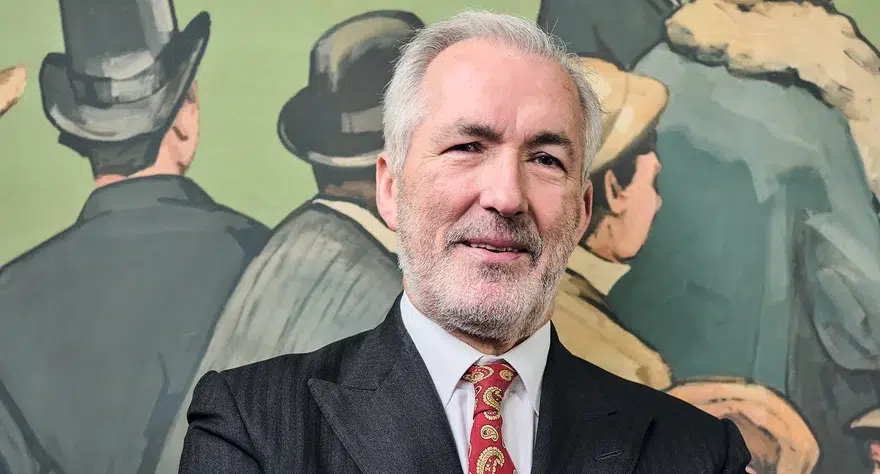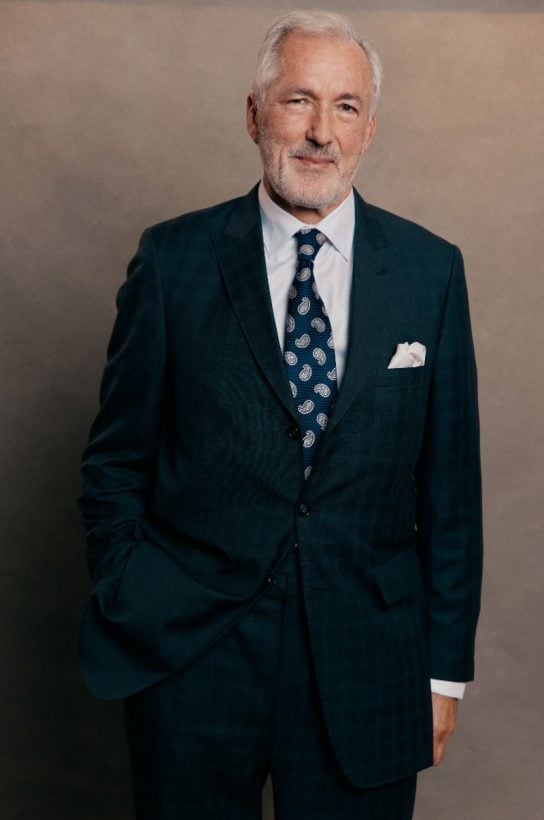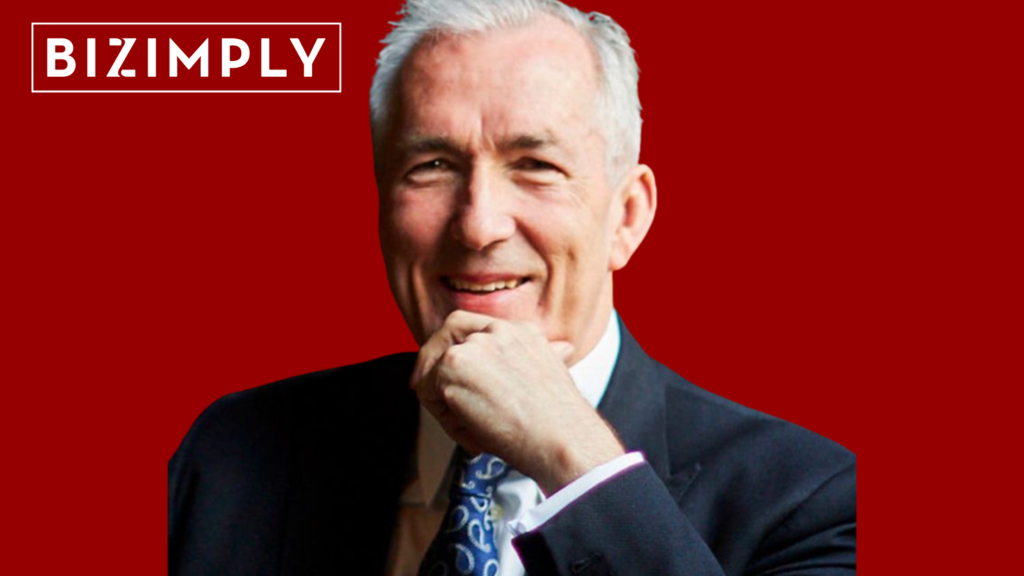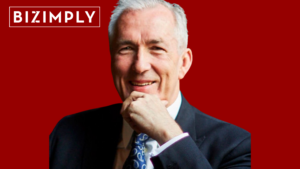“If you look at restaurateuring and its role in culture and society over the years, I do not think there is a single artistic, literary, architectural, musical, political, revolutionary movement that hasn’t started in a grand cafe, restaurant or brasserie. They are at the heart of the culture.”
Jeremy King
We are back with our BlogCast, a Bizimply blog series!
🎧 A series where we revisit some of our favourite episodes from The Hospitality Mavericks Podcast.
Today we are happy to spotlight Jeremy King’s episode! The famous UK restaurateur who has left a lasting impact on the hospitality industry joins the podcast to share his insights and experiences.
Jeremy King is the Co-founder of Le Caprice, the renowned London restaurant that attracted celebrities like Princess Diana and Andy Warhol during the Eighties and Nineties.
He is also an award winner of the OBE New Year’s Honour List of Service to the Hospitality Industry and Voluntary Services to the Arts 2014.
He chats with Michael Tingsager about the parallels between the new advancements that AI is bringing to the industry and other now normalised technologies like the touchscreen at the beginning of the 90s.
Join us as we take a deep dive into King’s journey and learn valuable lessons from his experiences.
Main Highlights:
- Why mentorship is crucial in hospitality.
- How humility can help to face setbacks.
- The importance of the human touch in technology.
Journey to Hospitality: From working in a wine bar to running Le Caprice
“I think I’m typical of a lot of people in hospitality in that I wasn’t vocational. Over the years when I’ve talked to staff, I’ve discovered that it’s actually chefs who tend to be vocational rather than front-of-house people like myself.”
“I fell into it for a very simple reason, as I came up into London at the end of 1972 and started merchant banking on January the 1st, 73. I was staying with a school friend who worked in a wine bar which was a very new invention in those days. You couldn’t open a bar in London, you couldn’t get a license, but you could open a wine bar. I worked two nights a week and like so many people supplement income, whether it’s a student or a worker, et cetera. And the great beauty is that as a comparatively shy, introspective person, they also get an element of social life, working in somewhere like a wine bar.”
He reflects on deciding to pursue a career in hospitality instead of continuing his academic career at Cambridge, throwing the dice to determine his fate.
“When the matriculation papers came through in May 75, I threw the dice and there was one as to what I would do about my university career. Most of the opportunities of the double dice throw were to go up to university, maybe change the course, maybe change the timing, things like that. But there was one throw, which I think was a double six which said, if you get the management of this bar or similar within a month of your 21st birthday, you stay in hospitality for life… and I did. There has been many a time I regretted it.”
“So I stayed in hospitality. I tried to get out of hospitality, I went for career guidance and all they could pick up on the fact was that I was logical and arithmetic and so on. They said I should be an accountant.”

“But there was one throw, which I think was a double six, which said, if you, if you get the management of this bar or similar within a month of your 21st birthday, you stay in hospitality for life.”
King shares his early experiences, including the chance to run Le Caprice restaurant in his early 20s, and how he eventually found his passion there.
“I said I’m leaving the business’. And he said, ‘No, you’re not’. And I said, ‘Well, I’m just not enjoying it enough’. He said, ‘What do you like about the business? Come on, tell me what you like.’ I said, ‘I like restaurants. ‘And what sort of restaurants?’ ‘Big restaurants,’ I said. And he said, ‘Right, you’re coming to work at Joe Allen’. I said, no, I’m not. It’s so wrong, I’m sort of a slightly uptight Englishman working in a New York speakeasy-type place. He said, ‘No, you’re coming because we’re going to show you how to run a big restaurant and I think you’ll excel at that. And more importantly, and I think you’ll get more out of it, we’ll show you how not to run a big restaurant and you’ll learn from what we do badly.’
“During that time going to Langans, I got to know Chris Corbin and we were running in parallel.”
“It was actually in a funny way what brought us most together was the eponymous Peter Langan who started Langan’s Brasserie and Odin’s and so on, who was an atrociously behaved but brilliant Irishman who died at the age of 47. He came to me and he said in his Irish draw, ‘I gather you should be the person opening my new restaurant’. ‘I said, I don’t think so. I’m 25 years old. I don’t think I’m qualified for that.’ Langan’s was a hot restaurant on a world scale, and I spent a lot of time with him and learned a lot, but I also spent a lot of time with Chris. Eventually, when the Langan initiative fizzled out, Chris and I resolved that we would open a restaurant.”
Joseph Ettedgui, a prominent figure in the fashion industry, approached Chris and inquired about his interest in opening a restaurant. Chris agreed to the proposition on the condition that he could do it in collaboration with Jeremy King.
“And out of that, we had found a site which had previously been called Le Caprice and at the time was called The Arlington and we did it together. It wasn’t a great success and when I say that the relationship with Joseph more than anything, we didn’t see eye to eye. We separated after a few months and then I managed to raise money. My parents very generously mortgaged their house to allow Chris and I to take control of Le Caprice, which was the best thing that ever happened.”
Mentorship in Hospitality is not only important, it’s critical.
“I think it’s critical and I think to be frank, the problems that Chris and I went through in the early days of Le Caprice, when we took control of it, I remember standing in the restaurant just before 10 o ‘clock of an evening in March 82, and not being a single person in the whole restaurant.”
“Yes, the early people had gone and it wasn’t that busy, so they’d gone quicker and then the post theatre because luckily, I had a lot of theatrical friends who made a big difference to the restaurant, because they were recognizable and they were staying late, and they were vivacious and atmospheric in the restaurant. But I think what it did to Chris and me is that it took away the hubris, and too often it’s too easy to open a restaurant and do very well, and suddenly it looks easy, and you open two or three or four.”
“And I can remember opening Saturday lunch at the Ivy and we did a zero and anybody in the restaurant business who’s ever done a zero that is, that is an extraordinary experience in the theatre, you don’t ever do a zero because if nobody turns up, you just shut the theatre and go away”
“But in a restaurant, you have to stand there, you have to keep the staff positive. You have to reassure them and you have to, you almost got this fixed smile on your face, hoping that somebody will walk through the door and they don’t. It’s humbling.”
“And what I’ve noticed with restaurants is that it will get incredibly popular and successful and often the staff and sometimes the proprietors start to get very complacent and they start to think they can do no wrong. When you hear phrases like staff say, I don’t know why they’re complaining about their table. I did them a favour by getting the one in the first place, and I would say, no, no, no, no, no. You didn’t do anybody a favour. They did us a favour coming to this restaurant.”
“But in a restaurant, you have to stand there, you have to keep the staff positive. You have to reassure them and you have to, you almost got this fixed smile on your face, hoping that somebody will walk through the door and they don’t. It’s humbling.”
“One of the things I would do from time to time when I talk with staff and say to those who have done an opening: I want you to think back to when you did an opening, and how it was those first few weeks, how everybody walked through the door was a hero, was lauded and treated so well. Where is that same sense of hospitality a year later when you’re absolutely packed? Because every person who walks through the door might be the best customer you ever have. Every person you talk away on the phone. I’ve had it myself where a telephonist in a popular restaurant will laugh at you for having the audacity to ask for a table that evening. We can be very bad in the restaurant business and humility is important and I’d like to think that both Chris and I had that.”
Being a restaurant owner versus being a restauranteur
Despite the hospitality industry’s resistance to change, Jeremy highlights the success of his partnership with Chris in navigating and implementing innovations.
“I think one of our great strengths is that as an autodidact myself, completely self-taught or through observation, Chris would set out how traditionally a restaurant would be sorted out. [..] And then I would tend to look at it and my rational, logical brain would come and say, “why do we do it that way?” and people would say that’s how it’s always been done. One of the great joys for me is looking at how it could be done better, and there are two strands of this because hospitality is naturally incredibly reactionary and hates change.”
The thing my staff will hear me talk about more and more, will always be the quote from Prince Tancredi in the novel, The Leopard, well, it’s a semi-novel about the changes in Italy in the 19th century and an interesting book in itself. One of the characters goes to the quite radical Prince Tancredi, who’s I think the nephew of the hero of the book, and he says, “why do we have to have all this change, why can’t it stay the same?” And Prince Tancredi says, ‘For things to remain the same, everything has to change’, and I’m a great advocate of that because you don’t change the ethics or the ethos or the principles or the integrity or anything like that, but you look always.
“Some of the older staff would always laugh because we might be in a meeting following winning an award, let’s say at the Wolseley or something, so we’ve won an award and I’ll ask the assembled managers, how are we going to win that next year?”
“And inevitably, while some of the old hands keep quiet because they know what’s coming, somebody falls into the trap of saying “By maintaining our standards”, I say, “All right, thank you, but maintaining standards is the route to bankruptcy”. And they say, “Well, how can that be if, you know, with these standards, we’ve just won an award, so if we maintain them, surely we have a chance of winning again”. But if your aspiration is only to maintain standards, actually they go down. It’s imperceptible at first, but they slowly go down because there’s an element of arrogance and complacency comes in and meanwhile, other people are getting better.“

“[…] My fear was when the phone stopped ringing because what happens in a restaurant, if you have a busy restaurant, you can completely mess up your service that evening. You’ll still be full tomorrow and tomorrow you can completely do a terrible service and you’ll still be full next week and even next week you can carry on and I don’t know and I never wanted to find out how long you got, but suddenly the phone’s not ringing and there’s nothing you can do because in my style of restaurants, you can’t do a promotion, you can’t do a discount.”
“But if your aspiration is to maintain standards, actually they go down. It’s imperceptible at first, but they slowly go down because there’s an element of arrogance and complacency comes in. And meanwhile, other people are getting better.”
Being a restaurant owner and being a restaurateur are two different things.
“Complacency and arrogance are the enemies of restaurateurs. The great thing is… I talk about restaurateurs and quite often people ask me, ‘What is the difference between a restaurateur and a restaurant owner?’ And as I said, ‘It’s very simple. The restaurateur does it from the floor and the restaurant owner does it from the boardroom,’ and it does show. When you look at, when restaurateuring is transferred into figures, it is very easy to make decisions about margins and so on because you’re not looking into the eye of the customers or the member of staff, but if you’re are a restaurateur you do it from the floor and you feel it”
Humility in the Hospitality Business
I think it all becomes about humanity and you were talking about technology and of course, at the moment there’s, there’s so much talk about AI and how it’s going to affect us […]”
Not long before I lost the auction for the restaurants, I was going around all my front-of-house teams, particularly the reception team […] I was with one particular group and something got into my head and I went to a different direction where I said, “okay, I brought you together to inform you that I decided to replace you all with artificial intelligence, with robots.”
And they’re looking at me and they think, yeah, this is Jeremy up to one of his tricks again, you know, there’s a punch line here, what’s he saying? And I went on and I said, and “why wouldn’t I?”
“I mean, let’s look at the robots. They’re never late, they don’t go on holiday, they’re not coming in with a hangover, they’re not only thinking about this evening, they’re not surreptitiously trying to look at their phone during the service. And as for customer interaction. Somebody comes through the door, they say, good evening, how are you? Do you have a reservation? and the person coming through the door will say, yes, my name is King and they’re not widely looking through the lists of names, etc because they haven’t bothered to read the manifest properly. Immediately the robot says ‘Yes, Mr. King table for two at eight o ‘clock’ and they’re not looking around to see if the table is ready. They know that the tables are ready[…]”
[…]So it goes on. Yes it’s expensive and the return on investment is going to be pretty good, so why wouldn’t I? And they’re still looking at me the staff, and they say, “is he serious? He’s not really serious, is he?” And I said, “well, I’ll tell you why I’m not actually going to do that”:
“Because those robots have no empathy, they have no sympathy, they have no intuition, they have no instinct, and they can’t love. And these are all things you can do, but you’re not. So, if you don’t start humanising yourself and looking at the person coming through the door as you would yourself, then you’re going to lose out to AI, but we have an immense advantage over everybody, particularly in hospitality that’s when we want to be looked after we’re not looking for pure efficiency.”
“So early 90s, they’re saying soon there will be computers where you’ll be able to touch the screen and things will happen. […] I announced that we’re going to move to touch screens, which made it so much easier. And a lot of the staff said, no, we want to stay with the old system, because of the fear of change. I remember putting up a big sign because I keep hearing. “Why can’t we just leave it, you know, leave it as it is, as normal?” I put a big sign outside my office and said, ‘Change is normal’. And left it like that because that’s what’s holding us back.”
Do you want to hear more about the inspiring stories of Jeremy King? Discover by tuning in to Jeremy King’s Hospitality Mavericks podcast episode. Don’t miss out!
Interested in working with Jeremy King? “Whilst we will not be approaching anyone directly, there are many that we would be delighted to hear from. Please do email your CV over to [email protected].“
If you enjoy our content, share it with a colleague!












